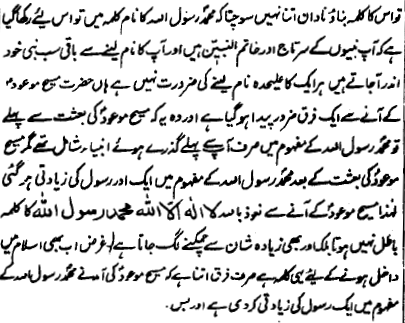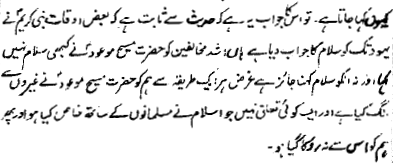Showing Islam is Peaceful • Tolerant • Rational • Inspiring
| Home
|
| 1.
Islam |
| 2.
Ahmadiyya Movement Refuting the Qadiani Beliefs Qadianis declare other Muslims as kafir |
| 3.
Publications & Resources |
|
Related link: Qadianis declare other Muslims as kafir Book Kalimat-ul-Fasal by Mirza Bashir Ahmad declares Muslims as kafir and non-Muslim in Islamic lawThe Qadiani Jama‘at has placed on its www.alislam.org website, in December 2007, the book Kalimat-ul-Fasal by Mirza Bashir Ahmad published by them in 1915, and written only a few months after the Split of 1914. Below is a link to the book: www.alislam.org/urdu/pdf/Kalma-tul-Fasal.pdf The author, a son of Hazrat Mirza Ghulam Ahmad, was the younger brother of the then khalifa of their community Mirza Mahmad Ahmad. In this book are expressed, in the most stark and unambiguous language, those highly dangerous and extreme beliefs which were entirely unacceptable to many leading Ahmadis, who thereupon formed the Ahmadiyya Anjuman Isha‘at Islam in Lahore to preserve the real teachings and mission of Hazrat Mirza Ghulam Ahmad. Its online publication is surprising because for several decades, starting in the 1950s but more particularly since 1974 when Ahmadis were declared non-Muslim in Pakistan in the state constitution, the Qadiani Jama‘at had been distancing itself from these repugnant doctrines. In summary, those objectionable doctrines are that:
We quote below some extracts from this book showing how it presents the above beliefs. The original Urdu text is displayed below as images from the online book. (Note: The version of this book on the Qadiani Jama‘at website has been taken from the March-April 1915 issue of the Urdu Review of Religions. The page references given here are to that version. The same pages from the magazine were also reproduced as a separate book, in which the number of each page is 90 less than the corresponding page number in the magazine.) Mirza Bashir Ahmad begins a chapter as follows:
After quoting such a verse, he concludes:
It is declared here that all Muslims who do not belong to the Ahmadiyya Movement are non-Muslims because they do not believe in Hazrat Mirza Ghulam Ahmad as a prophet, just as Jews and Christians are non-Muslims for not believing in the Holy Prophet Muhammad as a prophet. Such a Muslim is declared as not merely a kafir but a pukka kafir, meaning staunch or firm kafir. Later on he writes:
Later in the book, Mirza Bashir Ahmad replies to several objections against his standpoint that the above were the beliefs of Hazrat Mirza Ghulam Ahmad. One of these objections is: If he is a prophet as the Holy Prophet Muhammad was prophet, then why did he not require his followers to recite a kalima in his name? Mirza Bashir Ahmad declares this to be a foolish objection and writes:
It is plainly stated here that although members of the Qadiani Jama‘at proclaim the same Kalima in words as other Muslims, namely, “There is no god but Allah and Muhammad is the Messenger of Allah”, but they actually have in mind something more added to it, over and above what other Muslims believe. How can they then complain if the opponents of the Ahmadiyya Movement accuse them of reciting a different kalima? Relations with other MuslimsClose to the end of this treatise, Mirza Bashir Ahmad answers the objection that if his standpoint is true, then why did the Promised Messiah still permit his followers to have those relations with other Muslims which are required exclusively between one Muslim and another, and are not allowed with non-Muslims. He replies:
He goes on to give examples of how Ahmadis can only have those relations with non-Ahmadis which Islam allows Muslims to have with Christians or with Jews:
According to this explanation, when a member of the Qadiani Jama‘at says assalamu alaikum to a non-Ahmadi he does so only as he would to a Jew or Christian in some circumstances, only as a return of greeting, and not as a sign of the common bond of the brotherhood of Islam. He then replies to another question under the same objection about relations with other Muslims:
In his reply he tells us that there are two kinds of commandments in Islam: those to be carried out by the individual and those that can only be carried out by the government or the law of the land. Then he writes:
Just ponder over this last statement! It is declaring, openly and bluntly, that if the Head of the Qadiani Jama‘at were to have the power to make laws in a country he would issue orders to the effect that non-Ahmadis should be treated as non-Muslims under the law of the land. So on what grounds can the Qadiani Jama‘at complain when they themselves are declared as non-Muslims under the law of the land in Pakistan? All these extreme beliefs came back to haunt the Qadiani Jama‘at with a vengeance. They were declared non-Muslim in the law of the land by a government of non-Ahmadis in Pakistan in 1974 in exactly the same way as Mirza Bashir Ahmad has here proclaimed that his Jama‘at would do to non-Ahmadis if it should possess political power. They are prevented by the anti-Ahmadiyya groups from using or displaying the kalima because, it is alleged, they add Mirza Ghulam Ahmad in it by implication. Then there are the widely-reported assalamu alaikum court cases in Pakistan in which members of the Qadiani Jama‘at have been charged by the police with the crime of using this greeting, which is meant for use by Muslims. As quoted above, according to Mirza Bashir Ahmad when members of his Jama‘at say assalamu alaikum to other Muslims it does not mean they are regarding them as Muslims. No doubt, all these repressive legal restrictions against them are highly unjust and a complete travesty of the teachings of Islam, and deserve total condemnation. But the Qadiani Jama‘at leadership themselves believe in directing the same unjust measures against all other Muslims. |








